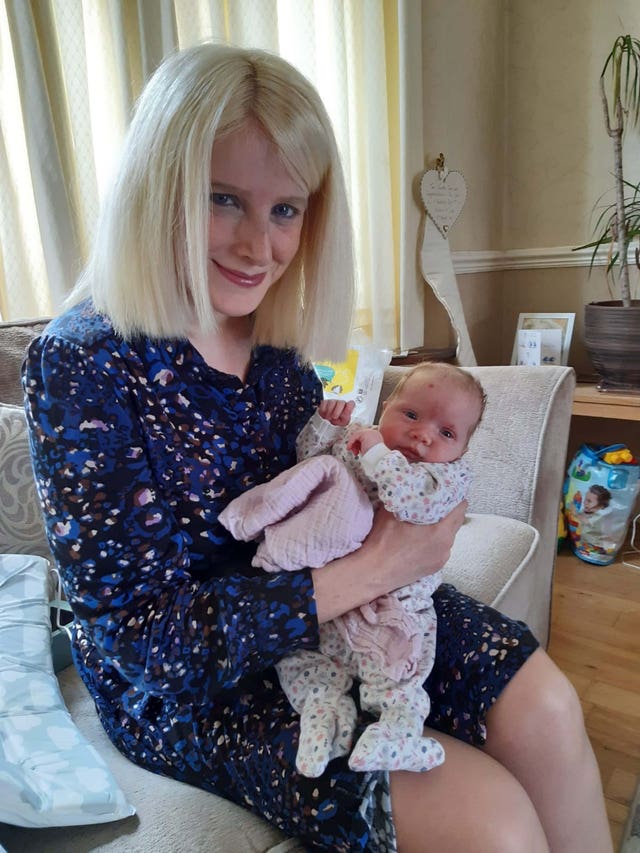
Dozens of babies with spina bifida have been spared paralysis by having surgery before they were even born.
NHS England said the intricate surgery, which involves a team of up to 30 medics, has been carried out on about 32 babies in the womb since January 2020.
Spina bifida prevents the spine and spinal cord developing properly and can lead to paralysis, as well as bowel, bladder and kidney problems.
Schoolteacher Helena Purcell, whose unborn baby was diagnosed with spina bifida, was operated on by the NHS when she was 23 weeks pregnant.
She was originally told that her baby would likely be paralysed and incontinent, and would need a shunt in the brain.
Ms Purcell, who had become pregnant after six failed attempts at IVF, gave birth to a baby girl called Mila at University College London Hospitals NHS Foundation Trust (UCLH) in March 2021, three months after the surgery.
She said: “I cannot explain the massive difference the service has had for my family. The NHS doctors are heroes in my eyes, and the surgery they did is just mind-blowing.
“If it wasn’t for them then Mila would be paralysed. I am just so grateful that she has had this chance.”
Mila can move her legs, is fully continent and although she still has some fluid on her brain, is so far showing signs of good development.
She is now under the observation of Great Ormond Street Hospital for Children NHS Foundation Trust (GOSH).
Operating on babies at between 23 and 26 weeks of pregnancy, instead of after birth, results in a much better outcome for the baby, NHS England said.
Among the team who carry out the surgery are fetal surgeons, neurosurgeons, anaesthesiologists – for both mother and baby – obstetricians, neuro-paediatric surgeons, radiologists, a scrub team and neonatologists in case the baby needs to be delivered.
NHS England’s medical director Professor Stephen Powis said: “As well as fighting a global pandemic the NHS continues to develop and offer these trailblazing services and continues to be there for patients.”

Specialists in London and Belgium have been part of the multidisciplinary team effort.
The NHS England-commissioned programme involves teams from UCLH , GOSH and University Hospitals Leuven in Belgium.
GOSH’s lead neurosurgeon at Dominic Thompson described the procedure as “complex, time-sensitive and not without its risks” but added that “the significant and life-changing impact on babies, like Mila, and their families, cannot be overstated”.
He said: “At GOSH we continue to see many of the children who’ve benefitted from fetal surgery in our specialist spina bifida clinic for their after-care, and what we’ve noted is a reduced need for shunts and further invasive surgery, as well as improved mobility. This makes all the difference to the quality of their lives.”
Professor Anna David, a fetal medicine consultant at UCLH and the service lead, said the system had been streamlined to make it easy for patients and referring hospitals.
She said: “Our co-ordinator based at UCLH manages referrals from the whole of the UK and devolved nations. Patients are then offered surgery either at London or Leuven, based on their geographical location. We are really pleased to offer this joined-up service to smooth the patient journey as much as possible.”
Kate Steele, chief executive at Shine, the national charity supporting people with spina bifida and hydrocephalus, said: “Shine is delighted that Helena has had such a positive experience of fetal surgery for her baby with spina bifida.
“By commissioning this excellent service, the NHS has added an option for some parents expecting a child with spina bifida.
“We hope, going forwards, that every family who might benefit from fetal surgery, is given the opportunity to find out whether surgery is right for them, and that they are supported by their local service, as Helena was.”


Comments: Our rules
We want our comments to be a lively and valuable part of our community - a place where readers can debate and engage with the most important local issues. The ability to comment on our stories is a privilege, not a right, however, and that privilege may be withdrawn if it is abused or misused.
Please report any comments that break our rules.
Read the rules here